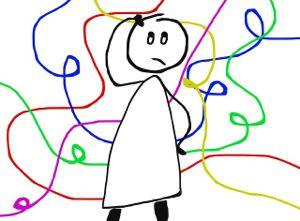What do you struggle with as a writer?
When I asked myself that question, my immediate answer was “marketing.” I’m sure a lot of authors would agree with me. I enjoy certain things I do that are considered marketing—like staying active on social media, maintaining a robust blog and newsletter, speaking, and guest posting—but when it comes to advertising or pushing my books, those activities tend to fall to the bottom of the list.
Then I wondered how other writers might answer that question. I did a quick search of this year’s guest posts so far, and found five things that came up again and again.
What can we do about these things? Here are some suggestions.
 1. Writers Struggle with Marketing
1. Writers Struggle with Marketing
If you’re struggling with marketing, too, there’s no end of advice online about how you “should” do it. What activities work best for selling your book? The answers vary depending on the type of book you’ve written, the reader you’re targeting, and the person who’s giving the advice.
There are a lot of folks more qualified than me to guide you on this one, and I encourage you to seek them out and give their suggestions a try. I do have one thing for you to consider, though: marketing is something we all need to be doing on an ongoing basis, so the best option is find those activities you enjoy, and then schedule time into your schedule to do them regularly.
What writers really have to do in today’s world is build an audience. That takes time and consistent effort, so you’ll want to find
- a) marketing activities that bring readers to you, and
- b) marketing activities that don’t require alcohol just to make them palatable.
After struggling with marketing for a while, I’ve finally relaxed into regularly pursuing a handful of activities that I find enjoyable and rewarding. Trying to do things that grate against your nature is to fight a losing battle. Regularly blaming yourself for not marketing like other writers market is also unproductive.
What activities might work for you? Here are several you can try:
- Blogging (consistently!)
- Guest posting
- Podcasting
- Doing radio and television interviews
- Speaking at workshops and other events
- Building your email list (by regularly offering freebies)
- Sharing on social media
- Conducting giveaways
- Pursuing book reviews
- Purchasing advertising
- Setting up online or in-person book tours
Helpful quote from author Midge Raymond:
“While book promotion is often an author’s least favorite activity, it doesn’t have to be torture. Find what you enjoy—this may entail trying a bit of everything—and focus on that as you go forward.”
 2. Writers Struggle with Staying on Task
2. Writers Struggle with Staying on Task
If you struggle to avoid distraction, raise your hand!
You won’t be alone. I’ve conducted workshops on productivity and time management in various cities, and have had a lot of writers share their struggles with me. Distraction is a pervasive problem not only for writers, but for everyone these days.
“Life is busy,” says author Natalie Bright. “I struggle to stay on task, and I try to listen to the voices of my characters.”
“I’ve written about some of the distractions that keep me away from my laptop….,” says former journalist and literary writer Joanna Elm. “Without deadlines, I fear that I’m going to be writing my new novel forever!”
My latest release, Overwhelmed Writer Rescue, goes into this issue more in depth, but here are a few helpful tips:
- Don’t imagine you can focus with distractions. Start each writing session by turning off (or stashing) your cell phone, and closing down your Internet connection.
- If your mind is racing, either write down your worries and set them aside, or give yourself five minutes to focus on the task at hand. Often once you get into the writing groove that five minutes will turn into 10 or more.
- Honor your creative self by honoring your writing time. Don’t let feelings of guilt or stress rob you of that time. It’s critical to not only your writing career, but your well being.
Helpful quote from writer Chris Smith:
“You’re more likely to get distracted if your writing is flagging or it seems like a chore, so one way to inject a little levity into a writing project is to turn it into more of a game or a challenge. For example…writers splurge words in intensive 20-minute blasts followed by a five-minute break—and perhaps cake (cake is optional).”
 3. Writers Struggle with Feeling Overwhelmed
3. Writers Struggle with Feeling Overwhelmed
Writers struggle to find time to do everything they feel they need to do to support their careers. For most, writing is a side gig, and has to be done after regular work hours and in between making dinner for the kids and throwing in a load of laundry.
Of course, we’re not talking about just writing—writers must build an author platform and remain active in marketing their books all through their careers. It’s like having another full-time job in addition to the one that keeps the roof over your head.
“These days, I struggle with feeling overwhelmed as I deal with the stress of trying to balance my writing and life outside of it,” says fantasy writer Christine Rains. “I don’t want to neglect my family and home, but I feel like I’m failing myself if I don’t put all my energy into being a writer.”
“The challenges of anxiety, self-doubt, isolation, overwhelming demands, emotional exhaustion, absence of hope for my future, and lack of necessary skills each made their appearance during the year it took for me to figure out just how I was going to publish my book,” says artist and children’s writer Cindy Helms. “I had never in my life been more determined to accomplish something and each time one of those negative positions arose I would yell at it to go away.”
Things that may help:
- Set only three priorities for each day. Then tackle those priorities as early in the day as you can—or when you typically have the most energy. Once you get these done, relax and allow the rest to slide if necessary.
- Limit your decisions. Plan out your day the day (or week) before so you have fewer decisions to make. This helps avoid “decision fatigue” and keeps your willpower stronger for your writing-related tasks.
- Remember to take the long view. Writing is a lifelong pursuit. Focus on building a little bit every day and try to enjoy the process rather than stressing over the outcome.
Helpful quote from Brooke Warner, publisher of She Writes Press:
“For those of you dealing with too much too much too much, spend some time prioritizing. If you have more than one project, choose one to work on first. You need to implement a content strategy….If you don’t know what to do first, your attention will constantly be split, and you will be swimming in a sea of unfinished projects with no completion strategy in sight for any of them.”
 4. Writers Struggle with Rejection
4. Writers Struggle with Rejection
It doesn’t matter how long you’ve been in the writing game. Rejections hurt, and it can be a struggle to recover.
“I DO know the soul-deep pain of rejection and self-doubt,” said romance writer Teresa Neumann. “Killers, those two. For example, I spent around eight years trying to pitch my first book at numerous writers’ conferences….But after countless rejections, some of them humiliatingly heartless, I turned cynical and quit pitching my book. I couldn’t emotionally handle the snubs and rebuffs anymore.”
“The biggest emotional challenge of being a writer is avoiding the bottomless pit of dejection,” says YA writer Margo Kelly. “In the publishing world, rejection never ends; it comes from agents, editors, industry reviewers, and readers. Rejection is part of the process. Dejection is a choice.”
“I regarded every rejection as a sign that I was doomed to fail,” says fantasy writer Megan Cutler.
Some helpful tips:
- Realize you’re not alone, and that rejections are just part of the writing game. Give yourself a day or so to feel lousy about it, then put it aside and move forward either by getting some help on your story, or by submitting the story again.
- Get out and move. Exercise boosts feel-good endorphins in the brain. It will help take some of the sting out of the rejection.
- Find evidence of your talent. Dig out those positive comments and reviews that you’ve received on your writing in the past. Read them again. It will help.
Helpful quote from writer and editor Kyra Thomsen:
“It may be a bold statement, but rejection is part of what makes you a writer. Writers (and creatives in general) are the few people in the world whose nature it is to put their whole heart into something, get knocked back, then do it all over again without question. Rejection does not make you a bad writer, it makes you an artist.”
 5. Writers Struggle with Self-Doubt
5. Writers Struggle with Self-Doubt
This struggle remains for many writers regardless of how long they’ve been writing or what sort of success they’ve experienced.
“Writing is such an intensely personal thing, it’s daunting to release your work into the world,” says mystery writer Lori L. Robinett. “Though I dreamed of being a Writer (with a capital W), I struggled to overcome that fear that I wasn’t good enough for a very, very long time. (Wait—who am I kidding? I still struggle with that!)”
“I certainly struggled with self-doubt,” says literary writer Iris Yang. “It’s impossible! It’s too hard! It’s pointless; there are already so many books. Every time I went to a bookstore or a library, I wondered why the world needed another book.”
“But just a few months into the writing life,” says mystery writer Daryl Anderson, “I was ready to throw in the towel. The manuscript was such a mess, I considered abandoning the novel for a new project. But behind this thought was a more troubling doubt—maybe I wasn’t cut out to be a writer.”
The key here is to first, become aware of your own thoughts, and then to counteract them with positive action. Some tips:
- Figure out what triggered the doubting thoughts you’re having. Maybe you just received a rejection, you’re struggling with your writing project, or you noticed another author’s success.
- Step back and listen to your negative thoughts. Realize that you’re trapped in a bad habit and that you can break it.
- Take some sort of positive action, no matter how small. Reach out to a writing mentor or friend. Take a workshop or online class related to writing or marketing. Brainstorm some ideas. When you take action, you break the self-doubt habit, and help yourself move forward again.
Helpful quote from Nebula Award-nominated writer and World Fantasy Award-nominated editor Matthew Kressel:
“Sublimate your doubt. Use it as a tool. Actors are taught to channel their stage fright into energy, to bring more life to their characters. Writers can do this too. All emotions, all experiences, are food for us writers. Explore that neurosis, go deep into it, and you just might find a well of ideas ready to spring forth. Any human emotion is a treasure chest waiting to be opened.”
What do you struggle with as a writer?
Sources
Kressel, M. (2014, July 14). Overcoming Self-Doubt as a Writer – SFWA. Retrieved from https://www.sfwa.org/2014/07/overcoming-self-doubt-writer/
Raymond, M. (n.d.). 5 Everyday Book Marketing Tips For Authors. Retrieved from https://writersedit.com/self-publishing/5-everyday-book-marketing-tips-authors/
Smith, C. (2018, April 14). 5 ways to beat your creative distractions (and keep focused) – Prolifiko. Retrieved from https://prolifiko.com/keep-focused-beat-your-distractions/
Thomsen, K. (n.d.). How to Handle Rejection. Retrieved from https://writersedit.com/fiction-writing/handle-rejection/
Warner, B. (2017, December 6). 3 Ways Writers Get Overwhelmed — And What To Do About It. Retrieved from https://www.huffingtonpost.com/brooke-warner/3-ways-writers-get-overwh_b_7111342.html


Definitely marketing and feeling overwhelmed, though I’m learning to deal with these mini monsters, and not take things too seriously. I got into writing because it made me happy, brought me joy, that’s the long game. Do what you love. Great post, Colleen!
Such a good point, Sharon. We have to keep it fun! Thanks. :O)